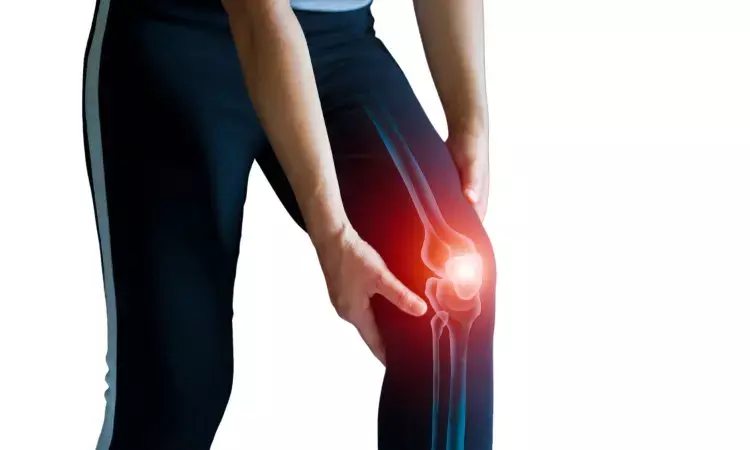- Home
- Medical news & Guidelines
- Anesthesiology
- Cardiology and CTVS
- Critical Care
- Dentistry
- Dermatology
- Diabetes and Endocrinology
- ENT
- Gastroenterology
- Medicine
- Nephrology
- Neurology
- Obstretics-Gynaecology
- Oncology
- Ophthalmology
- Orthopaedics
- Pediatrics-Neonatology
- Psychiatry
- Pulmonology
- Radiology
- Surgery
- Urology
- Laboratory Medicine
- Diet
- Nursing
- Paramedical
- Physiotherapy
- Health news
- Fact Check
- Bone Health Fact Check
- Brain Health Fact Check
- Cancer Related Fact Check
- Child Care Fact Check
- Dental and oral health fact check
- Diabetes and metabolic health fact check
- Diet and Nutrition Fact Check
- Eye and ENT Care Fact Check
- Fitness fact check
- Gut health fact check
- Heart health fact check
- Kidney health fact check
- Medical education fact check
- Men's health fact check
- Respiratory fact check
- Skin and hair care fact check
- Vaccine and Immunization fact check
- Women's health fact check
- AYUSH
- State News
- Andaman and Nicobar Islands
- Andhra Pradesh
- Arunachal Pradesh
- Assam
- Bihar
- Chandigarh
- Chattisgarh
- Dadra and Nagar Haveli
- Daman and Diu
- Delhi
- Goa
- Gujarat
- Haryana
- Himachal Pradesh
- Jammu & Kashmir
- Jharkhand
- Karnataka
- Kerala
- Ladakh
- Lakshadweep
- Madhya Pradesh
- Maharashtra
- Manipur
- Meghalaya
- Mizoram
- Nagaland
- Odisha
- Puducherry
- Punjab
- Rajasthan
- Sikkim
- Tamil Nadu
- Telangana
- Tripura
- Uttar Pradesh
- Uttrakhand
- West Bengal
- Medical Education
- Industry
Intra-articular calcium crystal deposition increases frequency and intensity of knee pain

In knee osteoarthritis (OA) cases, intra-articular (IA) calcium crystal deposition is common. A recent study published in Arthritis and Rheumatology has demonstrated a two-times higher likelihood of frequent knee pain and more intermittent or constant pain in patients with intra-articular mineralization.
Low-grade, crystal-related inflammation may contribute to knee pain. In the present study, researchers examined the longitudinal relation of CT-detected IA mineralization to the development of knee pain using data from the NIH-funded longitudinal Multicenter Osteoarthritis (MOST) Study.
At baseline, participants had knee radiographs and bilateral knee CTs. For two years, for every eight months, a pain assessment was done. CT images were scored using the Boston University Calcium Knee Score (BUCKS). They used generalized linear mixed-effects models to examine CT-detected IA mineralization in relation to the risk of frequent knee pain (FKP)/intermittent/constant knee pain worsening and pain severity worsening.
The key results of the study are:
- The study included two thousand ninety-three participants with a mean age of 61 years, 57% female having a mean BMI of 28.8 kg/m2.
- 10.2% of knees had IA mineralization.
- The presence of any IA mineralization in the cartilage has two times higher odds of having FKP.
- IA mineralization was associated with 1.86 times more frequent intermittent or constant pain.
- Similar results were seen for IA mineralization in the meniscus/ joint capsule.
- A higher burden of IA mineralization anywhere within the knee was related to higher odds of all pain outcomes. The OR ranged from 2.14-2.21.
Jean W. Liew, MD MS, lead author of this study, said Patients with IA mineralization had greater odds of demonstrating frequent and worsening knee pain. Therapies targeting crystal deposition should be developed to improve knee osteoarthritis symptoms.
Further reading:
Liew, J. W., Jarraya, M., Guermazi, A., Lynch, J., Wang, N., Rabasa, G., Jafarzadeh, S. R., Nevitt, M. C., Torner, J. C., Lewis, C. E., Felson, D. T., & Neogi, T. (2023). Relation of intra‐articular mineralization to knee pain in knee osteoarthritis: A longitudinal analysis in the MOST study. Arthritis & Rheumatology. https://doi.org/10.1002/art.42649
BDS, MDS in Periodontics and Implantology
Dr. Aditi Yadav is a BDS, MDS in Periodontics and Implantology. She has a clinical experience of 5 years as a laser dental surgeon. She also has a Diploma in clinical research and pharmacovigilance and is a Certified data scientist. She is currently working as a content developer in e-health services. Dr. Yadav has a keen interest in Medical Journalism and is actively involved in Medical Research writing.
Dr Kamal Kant Kohli-MBBS, DTCD- a chest specialist with more than 30 years of practice and a flair for writing clinical articles, Dr Kamal Kant Kohli joined Medical Dialogues as a Chief Editor of Medical News. Besides writing articles, as an editor, he proofreads and verifies all the medical content published on Medical Dialogues including those coming from journals, studies,medical conferences,guidelines etc. Email: drkohli@medicaldialogues.in. Contact no. 011-43720751


